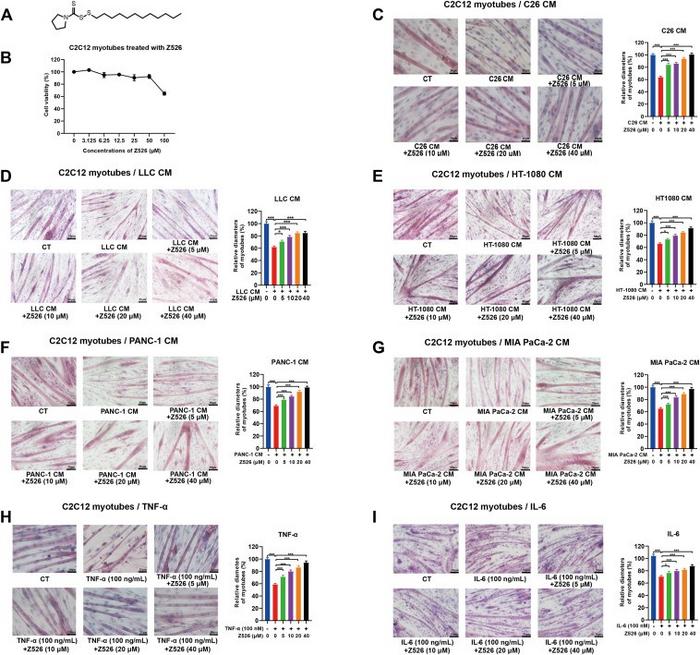A recent breakthrough in cancer treatment has emerged from a significant study recognizing Z526, a novel dithiocarbamate-like compound, as a remarkable agent in mitigating cancer-associated cachexia (CAC). The troubling phenomenon of CAC is characterized by weight loss, muscle wasting, decreased appetite, and systemic inflammation, profoundly impacting the quality of life and overall survival of cancer patients. Approximately 50% to 80% of individuals with cancer experience cachexia, leading to substantial mortality rates linked directly to this metabolic disorder. The study’s authors endeavored to explore the therapeutic potential of Z526 in both in vitro and in vivo settings, revealing promising results that could reshape treatment paradigms for patients suffering from CAC.
Administered orally, Z526 has shown the capacity to decelerate weight loss while simultaneously improving indicators of muscle and fat preservation, alongside grip strength. The underlying mechanisms driving Z526’s impact on CAC involve a comprehensive regulation of crucial biological pathways. Researchers reported that Z526 alters the NF-κB signaling pathway, renowned for its role in inflammation and immune response. Through the inhibition of phosphorylation and the nuclear translocation of P65, a pivotal protein in this pathway, Z526 appears to confer salutary effects against cachexia by neutralizing its inflammatory drivers.
Significantly, oxidative stress, defined as an imbalance between the production of reactive oxygen species (ROS) and the body’s ability to counteract their harmful effects, is another critical component of CAC progression. The study elucidates how Z526 effectively reduces ROS levels in cachectic muscle and adipose tissues. By addressing oxidative stress alongside NF-κB modulation, Z526 emerges as a dual-action contender, offering a multifaceted approach to counteracting the damaging processes underpinning cancer cachexia.
The comprehensive investigation highlighted Z526’s mechanistic interplay with metabolic signaling pathways. Notably, protein synthesis pathways, such as MHC, MyoD, and AKT, were positively influenced, while key players in protein degradation, such as MAFbx and p38, were downregulated. This balance between synthesis and degradation is vital for maintaining muscle mass and mitigating cachexia in cancer patients, illustrating the complexity of Z526’s action.
The significance of Z526 transcends mere cellular modulation; its implications for clinical practice could be revolutionary. Given that current treatment modalities for CAC remain largely inadequate—often individualized without addressing the multifactorial nature of the disorder—Z526 offers a ray of hope. Its ability to regulate multiple pathogenic mechanisms presents a compelling argument for its further development and evaluation in clinical trials.
In addition to its physiological benefits, Z526 boasts an advantageous preclinical safety profile. This is a critical consideration in drug development; compounds that can effectively provide symptomatic relief while presenting minimal side effects are imperative for long-term therapeutic strategies. The evidence amassed from this study set a sturdy foundation for the potential use of Z526 in clinical settings, addressing a significant unmet need in cancer care.
Beyond its applications in muscle preservation, Z526’s interaction with fat metabolism demonstrates its versatility. Adipocyte lipolysis was adequately suppressed in studies, which could inversely correlate with fat loss associated with cachexia. The insights derived from both the in vitro and in vivo assessments strengthen the case for Z526, painting it as a promising candidate for combating the wasting syndrome that burdens cancer patients.
The study, published in the esteemed journal Genes & Diseases, not only contributes to the existing body of literature addressing CAC but also opens avenues for interdisciplinary collaborations. Researchers hailing from East China Normal University, Fudan University, and Shanghai University of Traditional Chinese Medicine collectively spearheaded this inquiry, highlighting the importance of collaborative science in advancing therapeutic innovations.
Whether through oral administration or other delivery mechanisms, the substantive data backing Z526’s efficacy warrants immediate attention and urgency toward clinical exploration. The goal will be to translate these findings into actionable, scalable treatment options for the millions struggling against the ravages of cachexia, thereby altering the landscape of supportive care in oncology for years to come.
Subject of Research: Z526 and its effects on cancer-associated cachexia
Article Title: Novel oral compound Z526 mitigates cancer-associated cachexia via intervening NF-κB signaling and oxidative stress
News Publication Date: [Insert Date]
Web References: [Insert URLs]
References: [Insert References]
Image Credits: Credit: The authors
Keywords: Cancer, cachexia, Z526, NF-κB signaling, oxidative stress, muscle wasting, adipocyte lipolysis, therapeutic candidate.
Tags: anti-inflammatory cancer therapiescancer cachexia treatmentcancer-associated cachexia researchdithiocarbamate compounds in cancerimproving quality of life in cancer patientsmetabolic disorders in cancer patientsmuscle preservation in cancer therapyNF-κB signaling pathway modulationnovel cancer treatment strategiespromising therapies for cachexiaweight loss prevention in cancerZ526 therapy for cachexia





